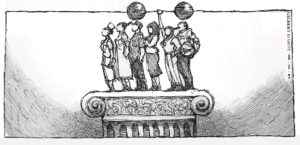Even in good times, life is hard for the poor, and harder once things turn bad. Per the United Nations, 395 million more people will fall into the extreme poverty category due to the pandemic. In many parts of the world, the pandemic continues to hammer the economically disadvantaged.
In responding to the health crisis, the Philippine government’s default mode is to implement community quarantines based on the gravity of the COVID-19 situation, but this has worked little to control the spread of the coronavirus. The economy has yet to rebound from its contraction last year, and those who suffer the most are the daily wage earners and small business owners.
Under these circumstances, it is imperative that there is an added dimension in responding to and recovering from the pandemic. The overriding concern should be the survival of the poor. Moving forward, a “poverty clearance” stipulation, similar to an environmental clearance certificate if you may, must be a prerequisite to any proposed action, i.e., legislation, policy, or program by the government, development organizations, and civil society.
NONO FELIX
San Felipe, Naga City



